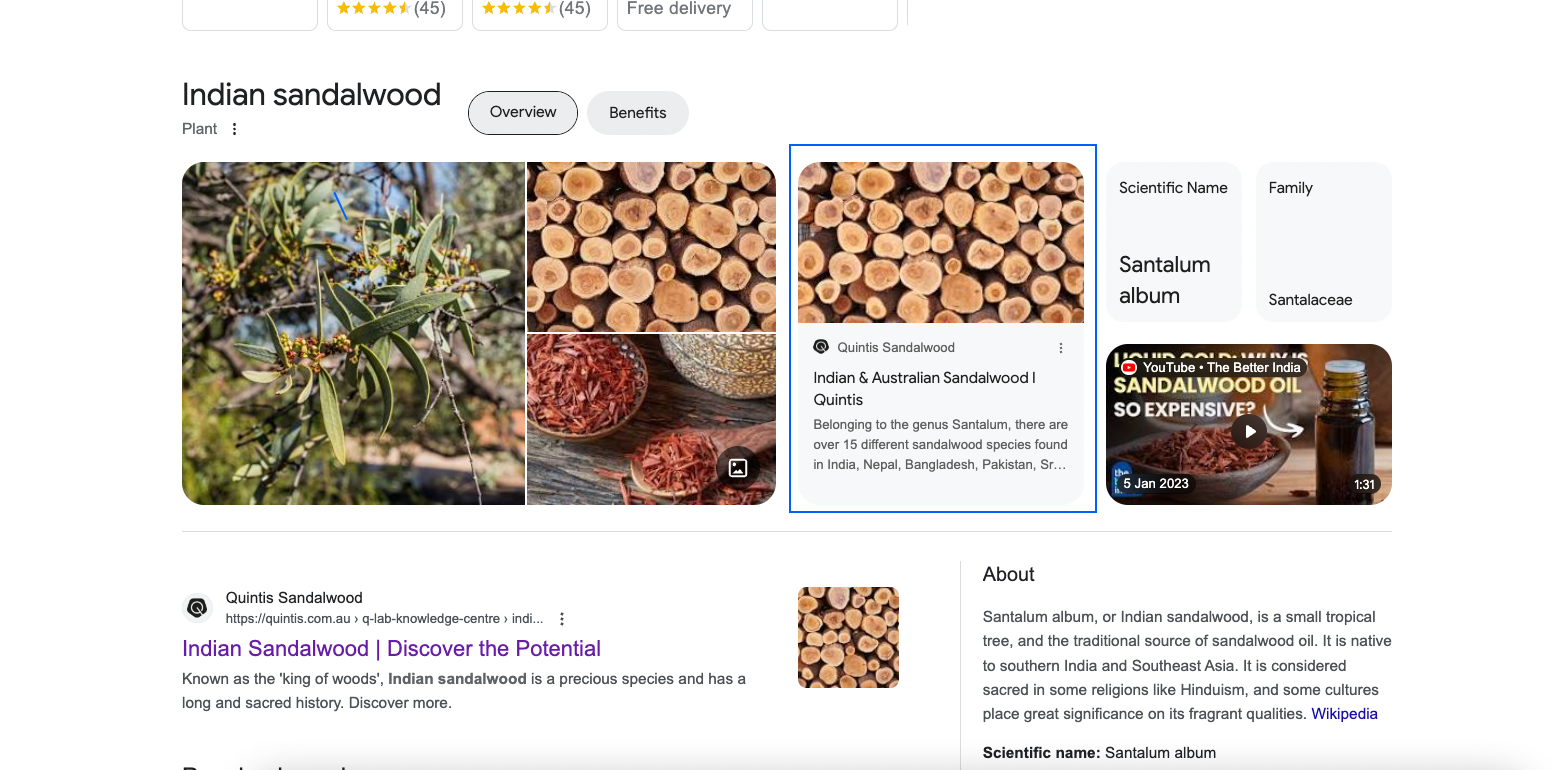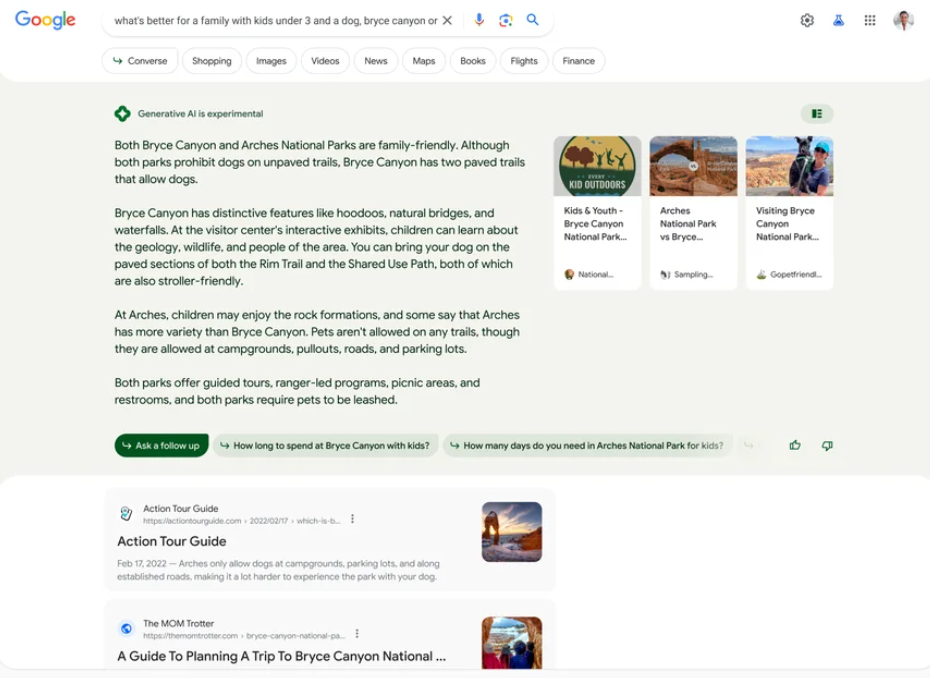Google’s New AI Search Engine: Big Changes Are Coming to SEO



With the release of Chat GPT and the new Bing (which is powered by GPT-4), Google has returned fire with its own AI-powered search engine which is set to replace the Google we all know.
Originally developed under the code name “Magi”, Google’s new iteration of its search engine (currently called the “Search generative Experience” or SGE) is set to be released next year. This could be the biggest change to Google we’ve seen to date.
Understandably, publishers, brands and marketers are worried. But what does this upcoming change to search mean for your website and more importantly, what do you need to do to adapt?
Short on time? Check out our key takeaways
- Google is developing a new AI-powered search engine, the Search Generative Experience (SGE), set to revolutionize how we search for information online.
- Potential downsides include a drop in organic search traffic for some websites and an increased importance (and likely cost) of paid search advertising.
- SEO will not be 'killed' by SGE but will significantly evolve, requiring well-crafted strategies and adaptable content across various platforms, including YouTube, TikTok, and Bing.
Change 1: Natural Language Queries
One major change in Google’s new search engine is the way we ask questions. With the integration of AI, we can now use more natural language when querying Google (remember when voice search has us scrambling to incorporate natural language into our content when voice search was all the rage?).
Instead of conducting multiple searches for specific information, we can simply type in our entire question and get a comprehensive result. No more sifting through irrelevant articles (unless you want to). This enhancement should make searching more efficient and user-friendly.
Change 2: AI-Powered Snapshot
Say goodbye to featured snippets. For those of us that spent so much time working to gain a rich snippet, this might come as sad news.

Google will be featuring an AI-powered snapshot at the top of search results, providing a summary of information. This snapshot gathers content from various blog sources and presents it alongside three featured pieces. By expanding the view, you can access additional content related to your query.
While the AI-generated answer gives a high-level overview, you still have the flexibility to explore other resources and make informed decisions.

Change 3: Ask a Follow-Up
Another interesting addition to Google's new iteration of search is the "ask a follow-up" feature. After asking an initial question, you can pose a related follow-up query without restating all the context. This refined search narrows down the results to cater specifically to your follow-up question. It's like having a conversation with Google and receiving targeted responses based on your previous queries.
The Impact of the New Google Search Engine on SEO
The positives
Now, let's look at the impact these changes will have on SEO and what you need to do to make sure that your brand stays visible in search.
- Enhanced Relevance: Due to users' ability to ask more natural and detailed questions, Google will gain a better understanding of search intent. As a result, the search engine can display more relevant and specific content, favouring websites that provide unique and helpful information. So, focusing on creating valuable content will continue to be a top priority for brands.
- Increased Visibility: The shift from snippets to the AI-powered snapshot means more content is featured at the top of the search engine results page (SERP). This presents a potential opportunity for publishers to be have their content included alongside the answers in the AI snapshot at the top of search results. Answer targets - A technique in which the content follows a question-answer format - will still play a crucial role in signalling to Google that your article addresses a specific query.
- Diverse Perspectives: With the new search engine, Google can showcase different angles and perspectives in a single SERP. This will likely benefit niche topics that might not have returned as much in-depth information. If you already rank high for specific queries, there's a greater chance of your content being featured or included in the SERP.
- Evolving User Behaviour: The follow-up feature encourages users to dive deeper into their search journey. Rather than settling for general information, users can explore more specific and refined content. This means users may spend more time searching the web, which creates more opportunities for brands and publishers to attract their attention and provide valuable insights.
The negatives
We've covered some of the positive changes we're likely to see with Google's new AI-driven search engine, but there is also a downside.
- Some websites will see a drop in organic search traffic: Websites that currently rank for rich snippets or in top positions of Google Search are likely to see a drop in traffic, since searchers will be able to get a quick answer to their question via the AI snapshot without having to leave Google and visit a website. Websites in lower positions will likely see the biggest drop in traffic as the AI snapshot will push "standard" search results below the fold.
- Paid search advertising will be more important than ever: With less organic listings visible above the fold in Google's new Search Generative Experience, paid ads which appear above the fold will likely be necessary to drive traffic to websites. The days of driving a majority of your traffic from "free" organic searches are likely numbered. I also believe that paid search advertising is likely to become more expensive, as more advertisers compete for the few paid placements at the top of results.
Will Search Generative Experience Kill SEO?
The short answer is no. But it will change SEO in a big way. Well-written, useful content that answers your audiences questions will be more important than ever to rank your website at the top of search, alongside the AI snapshot. In addition to distributing content via Google search, Marketers will need to put more emphasis on adapting content to other channels such as YouTube, TikTok, and yes, even Bing search.
Keyword research to uncover what people are searching for in your industry will remain a crucial component of SEO to drive your content strategy, and technical optimisations will still be important to ensure that your website is user friendly, loads quickly and is easily accessible to search engines. And when we speak about SEO, it will no longer apply to just Google. It will encompass optimisations made across all channels to ensure brands remain visible and relevant.
And of course, to tie this all together, having a well crafted strategy and knowledgable team to execute on it will be more important than ever.
Conclusion
Google's upcoming search engine - and the rise of artificial intelligence - marks another turning point for SEO.
While it may pose new challenges, such as the devaluation of commodity content, it also presents an opportunity for brands to leverage their experiential knowledge and deliver unique, helpful content. By adapting to these changes and focusing on providing value, your business can thrive in this new era of search.
Note: For those of you lucky enough to live in the US, you’ll be able to join the waitlist to try these new AI-driven search features via the new SGE Experiment in Search Labs. For us Aussies, we’ll just have to wait a little longer.




